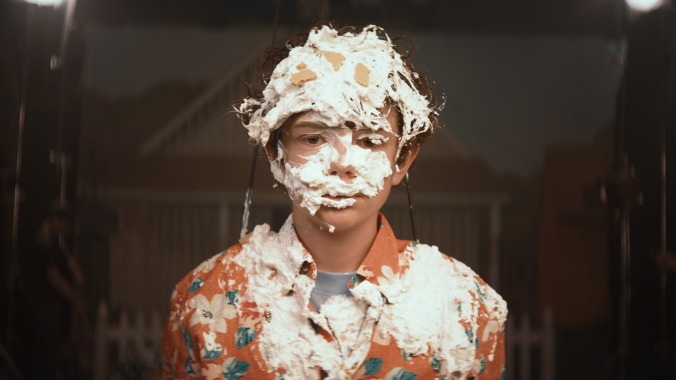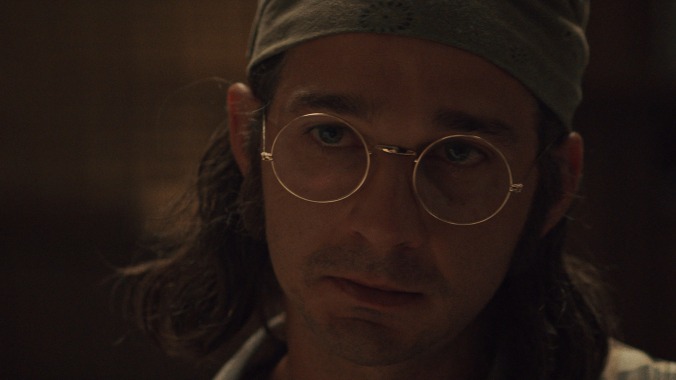

Shia LaBeouf knows that he’s hatable—which, paradoxically enough, is also the key to his likability. Once famous as a meathead ex-child actor prone to throwing drunken tantrums in public, LaBeouf has reinvented himself—as a weirdo performance artist and as an actor—in the decade that’s passed since he quit the Transformers franchise. (He’s still getting into trouble, though.) LaBeouf’s best performances, like his turn in Andrea Arnold’s American Honey, tap into the essential dirtbag quality he seems to carry at the core of his being. And that quality is more evident than ever in his new film, Honey Boy, in which LaBeouf plays a fictionalized version of his own deadbeat father.
LaBeouf completed the screenplay for Honey Boy while he was in rehab, and the film is clearly an extension of the undertaking he described to an Esquire reporter last year as, “I need to take ownership of my shit and clean up my side of the street a bit.” Honey Boy is a big-screen therapy session, both in its content—the counseling scenes are frequent and littered with therapy-speak—and in its basic conception. Lucas Hedges stars as Otis, a blockbuster action star with a drinking problem that lands him in rehab at the beginning of the film. (Sound familiar?) Stuck in a court-ordered inpatient facility, Otis is forced to confront the period of his life that’s fueling his self-destructive behavior: the years he spent starring in a brightly colored kidcom by day and living in a fleabag motel with his father James (LaBeouf) by night. Noah Jupe plays the preteen Otis in a series of flashbacks, which are woven together with the adult Otis’ struggle to get sober to form the structure of the film.
Both Hedges’ and Jupe’s performances as Otis are remarkably open and vulnerable, but the obvious attraction here is LaBeouf working through some shit in the guise of possessive, defensive, pathologically irresponsible addict and ex-rodeo clown James. LaBeouf is clearly using his own painful memories to fuel both the story and his performance, but the film never feels as if we are illicitly intruding on a private moment. In fact, in a manner not unlike LaBeouf’s 2015 #ALLMYMOVIES project, Honey Boy welcomes the audience’s rubbernecking, inviting us in to process our feelings about James alongside LaBeouf in real time. It’s also a sensitively observed performance, one that ultimately lands on a place of compassion for this often maddening and sometimes dangerous man. Humiliation, loneliness, fear, and anxiety are the primary emotions dredged up in scenes like the one where James assaults Otis’ assigned mentor from a Big Brothers Big Sisters program. But the film has enough faith in the therapeutic value of revisiting these feelings to end on a note of hope.
But while it was undoubtedly brave of LaBeouf to expose the rawest parts of himself on screen, the question is whether Honey Boy is more than just an experiment in psychodrama that got a distribution deal. Director Alma Har’el has primarily worked in documentary throughout her career, and although there’s an easy flow to her pacing, her first feature also suffers from many indie-movie clichés, from the distracting, shaky camerawork to the quirky electronic soundtrack. The motel where Otis and James live is also a more generic version of the economic milieu portrayed so perceptively in The Florida Project, except that the subplot involving Otis’ innocent love for sex worker Shy Girl (FKA Twigs) doesn’t carry nearly the same emotional weight. In short, then, no: Honey Boy isn’t much more than drama therapy. But whether you like or hate LaBeouf going in, you can’t help but root for him by the end.